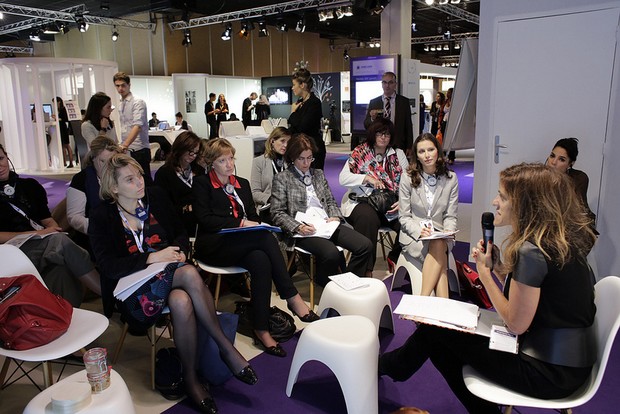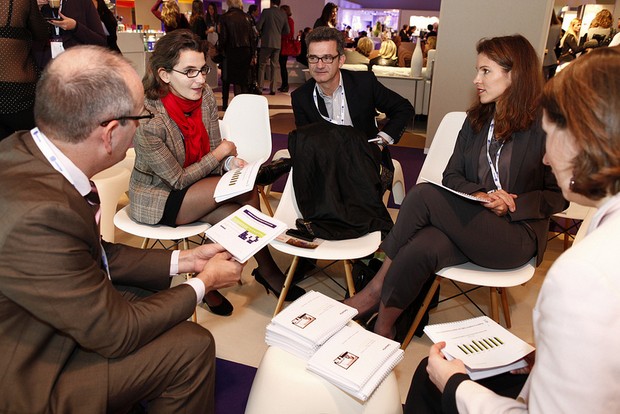To strengthen and promote women’s voices in the press and non-traditional media: this is the objective of the massive « Women in Media » initiative, which links the Women’s Forum with consulting firm Deloitte, ELLE, Facebook, LinkedIn, TF1 and Voxfemina, a Paris-based women’s lobby. Together with representatives of Agence France Presse and Human Rights Watch, and speakers from South Africa to London and Strasbourg, they crafted a kaleidoscopic program in 2012, the third year in which the initiative has featured prominently at the Women’s Forum Global Meeting.
PHOTOS DR Women’s Forum
A more prominent image of women as experts and professionals on television, the Internet and other media is important, not just because they are experts and professionals, but also in order to act as role-models. Yet as the 2010 Media Monitoring Project noted, « Women are systematically under-represented as experts in the media. 81% of experts and 82% of spokespeople quoted by media are men… women represent 19% of experts and 18% of spokespersons consulted on radio, television and by the written press. »
Debates kicked off with a broad panel discussion of how to deal with stereotypes about women in the media. Lindiwe Mazibuko, the young Parliamentary Leader of South Africa’s Democratic Alliance political party — who was also named one of the Women’s Forum Rising Talents in 2012 — spoke strikingly of the difficulties of being young and female in a very male world. Sophie Anconie, a French politician and member of the European Parliament, added anecdotes from her own career, while Mercedes Erra, the Executive President of Havas Worldwide and a very prominent woman in the advertising and media ecosystem, added a dose of wry humor. Isabelle Duriez of ELLE magazine discussed the recent publication of « Le Guide des Expertes », a reference guide to quotable women in fields ranging from engineering to economics. She noted that many journalists are in no way sexist; in fact, many journalists are women. But they thoughtlessly assume that familiar — and male — faces are more authoritative on subjects like economics than women are. Carla Buzasi, the Editor-in-Chief of The Huffington Post UK also contributed a number of strong points to the debate. The discussion was framed by presentation of an important survey by Deloitte of the way that women feature in media around the world.
The Women in Media initiative also showcased a discussion of women’s experiences reporting in hostile environments such as war, and the lessons that all of us can draw from their example. Anna Neistat, Associate Director for Program and Emergencies at the remarkable association Human Rights Watch, spoke with tremendous verve about her experience in investigating human rights violations on a rapid-response basis in Syria, Sri Lanka, Chechnya, and other countries, whileDaphné Benoît, a former Pentagon reporter and foreign correspondent for Agence France Presse movingly discussed her experiences reporting the Arab Spring rebellions, the para-military techniques in which she and other women reporters are schooled, and the often violent and disturbing attacks that several female journalists have encountered in Cairo and elsewhere.
A third session took a look at key reflexes that every woman can learn to improve her performance in interviews. Tips such as where to look (either straight at the camera or straight at the journalist — don’t flicker between the two) and how to stand (one foot slightly in front of the other, legs apart for maximum stability) may seem trivial, but the body language that they generate comes across on camera as a sense of security and confidence. Keep your message simple; start with your conclusion: none of this may come naturally to many women experts, who often feel they are being « pushy » if they seek media visibility. The take-home: do it. You won’t be perfect on camera, but that’s fine.
However fascinating the debates, the real gem of the Women in Media initiative is the individual coaching that it offers for Women’s Forum participants. Participants keenly signed up for one-on-one time with a remarkably skilled team of bilingual coaches from French channels TF1 and LCI, complete with makeup tips and a booklet of key lessons. LinkedIn also offered individual sessions with experts on how to build up a strong career profile in social media and getting the most out of LinkedIn. Finally, Facebook’s Elisabeth Linder gave a broad and considered perspective on boosting women’s potential via Facebook — one medium where women dominate men.


